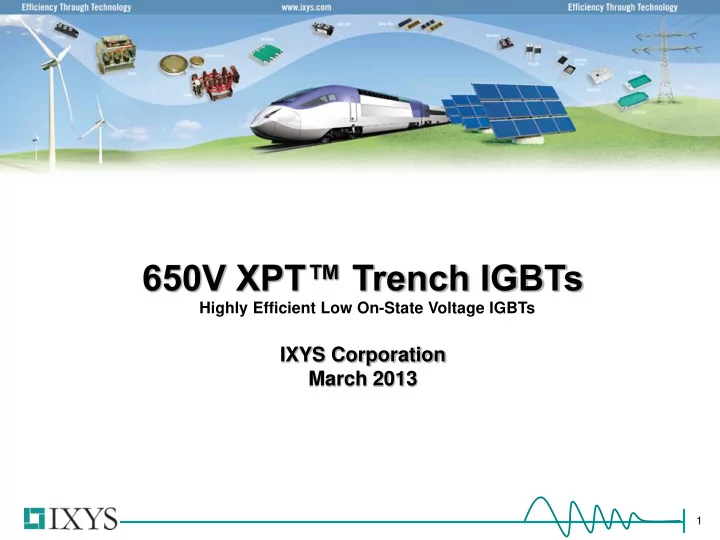

650V XPT™ Trench IGBTs Highly Efficient Low On-State Voltage IGBTs IXYS Corporation March 2013 IXYS 2008 Product Marketing IXYS 1
Product Line Introduction (65 0V XPT™ Trench IGBTs) Broadest discrete IGBTs portfolio at 650V (19 parts so far) From 30A to 200A current ratings at high temperature T C = 110°C Developed using IXYS’ eXtreme-light Punch- Through (XPT™ ) thin-wafer technology and state-of-the-art Trench IGBT process Designed for high-efficiency power conversion applications Low on-state voltages Short circuit capability (10µs) Low gate drive requirements Available in international standard packages (TO-247, TO-264, SOT-227B, PLUS247, ISOPLUS247™) Also available (upon request) in surface-mountable ultra-low profile SMPD and Mini-SMPD packages SMPD 2
Technology Advantages XPT™ Design Platform and GenX4™ Trench IGBT Process Thin wafer technology Reduced thermal resistance (R thJC ) Low energy losses Fast switching Low tail current Higher current densities Positive temperature coefficient of V CE(sat) Exceptional Ruggedness Reverse Bias Safe Operating Area (RBSOA) “Square” up to the breakdown voltage of 650V Able to operate without snubbers in hard-switching applications Short Circuit Safe Operating Area (SCSOA) 10µs at a high temperature of 150°C Ideal for motor drive applications Ultra-Fast Anti-Parallel Sonic- FRD™ Diode Temperature stability of diode forward voltage V F Optimized to reduce turn-off losses and suppress ringing oscillations Low electromagnetic interference (EMI) Short reverse recovery times (t rr ) 3
65 0V XPT™ Trench IGBTs Summary Table The largest selection of 650V IGBTs available in the industry! 4
Applications Targeted for high-efficiency power conversion applications (hard or soft switching – up to 60kHz) battery chargers e-bikes brushed DC motor drive lamp ballasts motor drives TIG welding inverter power inverters power factor correction (PFC) circuits switch-mode power supplies battery charger uninterruptible power supplies (UPS) welding machines 5
Trade-Off Curve Superior trade-off (turn-off energy loss vs. on-state voltage) 6
Recommend
More recommend